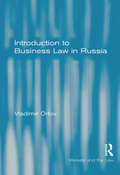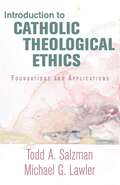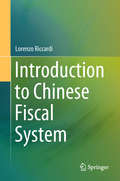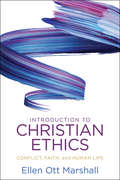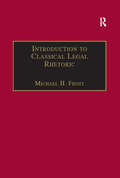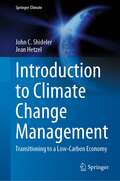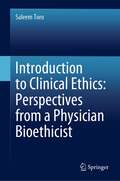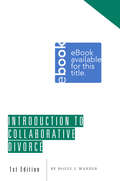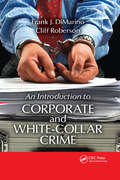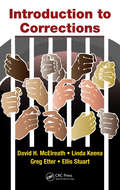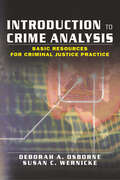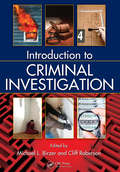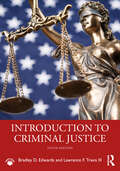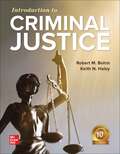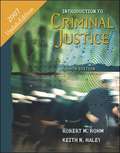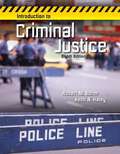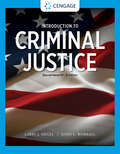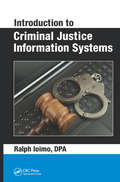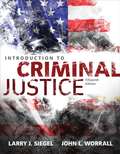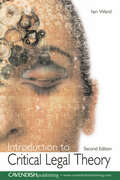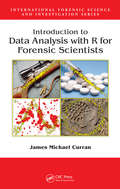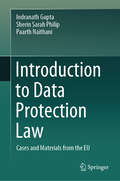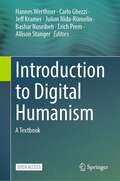- Table View
- List View
Introduction to Business Law in Russia (Markets And The Law Ser.)
by Vladimir OrlovThis volume provides a comprehensive overview of business law in Russia. It presents an introduction to the Russian legal system in general before going on to provide a thorough analysis of the key aspects such as regulation, taxation, competition, contracts, intellectual property law, among many others. Where appropriate, cases and international comparisons are included to help illustrate the practical workings of this complex system. The book will be an invaluable guide for students, researchers and practitioners who want a clear understanding of legislation relating to business in contemporary Russia.
Introduction to Catholic Theological Ethics: Foundations and Applications
by Todd A. Salzman Michael G. LawlerTwo renowned, award-winning authors in the field of virtue and sexual ethics introduce and then apply their ethical method to such topics as relativism, ecology, bioethics, sexual ethics, and liberation theology. The result is a foundational text for undergraduate courses in Catholic theological ethics.
Introduction to Chinese Fiscal System
by Lorenzo RiccardiThis user-friendly book aims to summarize the principal topics of Chinese Taxation and offers readers a general overview of the Chinese Taxation and informative updates on tax changes. The book provides a variety of facts, figures, graphs and data in an easy-to read table format. Firstly, the book proposes an introduction to taxation and to the Chinese tax system, secondly, it focuses on direct taxes, indirect taxes and other taxes and, in the end, it covers international taxation. Moreover, the book offers a quick overview of the Chinese M&A taxation and of the Chinese Free Trade Zones.
Introduction to Christian Ethics: Conflict, Faith, And Human Life
by Ellen MarshallAll Christians read the Bible differently, pray differently, value their traditions differently, and give different weight to individual and corporate judgment. These differences are the basis of conflict. The question Christian ethics must answer, then, is, "What does the good life look like in the context of conflict?" <P><P> In this new introductory text, Ellen Ott Marshall uses the inevitable reality of difference to center and organize her exploration of the system of Christian morality. <P><P> What can we learn from Jesus' creative use of conflict in situations that were especially attuned to questions of power? <br>What does the image of God look like when we are trying to recognize the divine image within those with whom we are in conflict? <br>How can we better explore and understand the complicated work of reconciliation and justice? <P><P> This innovative approach to Christian ethics will benefit a new generation of students who wish to engage the perennial questions of what constitutes a faithful Christian life and a just society.
Introduction to Classical Legal Rhetoric: A Lost Heritage (Applied Legal Philosophy)
by Michael H. FrostLawyers, law students and their teachers all too frequently overlook the most comprehensive, adaptable and practical analysis of legal discourse ever devised: the classical art of rhetoric. Classical analysis of legal reasoning, methods and strategy is the foundation and source for most modern theories on the topic. Beginning with Aristotle's Rhetoric and culminating with Cicero's De Oratore and Quintilian's Institutio Oratoria, Greek and Roman rhetoricians created a clear, experience-based theoretical framework for analyzing legal discourse. This book is the first to systematically examine the connections between classical rhetoric and modern legal discourse. It traces the history of legal rhetoric from the classical period to the present day and shows how modern theorists have unknowingly benefited from the classical works. It also applies classical rhetorical principles to modern appellate briefs and judicial opinions to demonstrate how a greater familiarity with the classical sources can deepen our understanding of legal reasoning.
Introduction to Climate Change Management: Transitioning to a Low-Carbon Economy (Springer Climate)
by John C. Shideler Jean HetzelThis book provides climate students with the basic scientific background to climate change management. Students will learn about international and national approaches to climate change management defined in voluntary initiatives as well as in national law and international agreements. The book describes mitigation and adaptation measures, monitoring and reporting of greenhouse gas emissions, and strategies for achieving a low-carbon economy, including green finance.This book combines theory and practice, introducing students to the conceptual background but also taking a professional and technical approach with case studies and low carbon toolkits. Filled with didactic elements such as concept schemes, tables, charts, figures, examples, as well as questions and answers at the end of the chapters, this book aims to engage critical thinking and the discussion of important topics of our days.The low-carbon strategy is one of the answers to limiting the greenhouse effect on our planet. This strategy is to minimize the overall carbon consumption in the life cycle of the products we consume, from the extraction of raw materials to the end of their life. The future is being built today. This book will guide its readers along the path of imagining and realizing a low-carbon economy.”
Introduction to Clinical Ethics: Perspectives from a Physician Bioethicist
by Saleem ToroThis textbook offers an introduction to the field of bioethics, specifically from a practicing physician standpoint. It engages a wide range of recent scholarship and emerging research covering many crucial topics in clinical ethics. While there has been increasing attention to the role of bioethics in medicine, the gap between theory and practice still exists, and it continues to impede the dialogue between health care professionals from one side and bioethicists and philosophers of medicine from the other side. This book builds bridges and open channels of connection between different parties in these conversations. It does so from a physician’s practical perspective, engaging recent scholarship and emerging research, to shed light on pivotal ethical dilemmas in contemporary clinical practice.
Introduction to Collaborative Divorce
by Holly J. WanzerHelp Your Clients Achieve a "Total Family" Settlement Through Collaborative Divorce Contrary to popular myth, the collaborative divorce process does not require the parties to hold hands at the negotiating table or join in a meditation circle or a group sing-along. It does, however, require a collective shift from the "win/lose" paradigm of more traditional divorce process options to the "win/win" paradigm that governs every aspect of the collaborative process. If you are curious about (or, perhaps, skeptical of) the idea of "collaborative" divorce, Holly Wanzer's Introduction to Collaborative Divorce is for you. This book dispels the myths surrounding the collaborative process and offers straightforward how-to advice gleaned from the author's experience. Introduction to Collaborative Divorce answers the questions you and your clients may have about collaborative divorce, and gives you practical tools to help you make the paradigm shift necessary to reach a collaborative settlement. You learn the "who, what, why and how" of collaborative divorce, including: Why is it important to educate every client about the different divorce process options available? What are the core principles that distinguish collaborative divorce from other divorce processes? What are the five core requirements of a collaborative divorce? What are the practical advantages of the attorney withdrawal provision? What are the ethical underpinnings of the attorney withdrawal provision? Other than the spouses and their attorneys, who are the potential "team members" and what role do they play? How does the "team approach" of a collaborative divorce actually work in practice? How do collaborative "interest-based" negotiations differ from "rights-based" negotiations? What kinds of collaborative tools are available to help overcome an impasse in the negotiations?
Introduction to Construction Contract Management
by Brian GreenhalghThis book is an introduction to construction contract administration and management, covering the delivery and execution stage of a construction project and the various issues which the contract administrator needs to proactively manage. It can therefore be used as a contract administrator’s resource book covering what needs to be done (and why) to keep a construction project on track from a commercial and contractual perspective. It is particularly appropriate for students and new practitioners from varied construction professions and whilst it covers domestic (UK) projects, it will be particularly useful for those studying and working on international projects where terminology, procedures and legal systems may differ from the UK. The content is split into four parts and is subdivided into easy-to-read chapters replicating the timeline of a project during the construction stage: Part A covers initiating the construction stage, project delivery mechanisms, contract administration and health and safety management; Part B covers managing the construction stage, contractor performance and relationship management; Part C covers finalising the construction stage, project completion and close-out; Part D covers claims and disputes. Introduction to Construction Contract Management will be particularly useful for students enrolled on global construction programmes together with international distance learning students and non-cognate graduates starting out on an international career in construction contract administration and quantity surveying.
Introduction to Corporate and White-Collar Crime
by Cliff Roberson Frank J. DiMarinoWhite-collar crime costs the United States more than $300 billion each year. It is surprisingly common, with one in every three Americans eventually becoming a victim. The criminals often dismiss these crimes as victimless, but those unfortunate enough to fall prey would disagree. An Introduction to Corporate and White-Collar Crime provides readers
Introduction to Corrections
by David H. McElreath Greg Etter Linda Keena Ellis Stuart Jr.Millions in our nation are under some type of judicial sanction, with some individuals behind bars but the majority serving their sentences while living and working among us. Introduction to Corrections examines predominant issues related to the system of administering to offenders in the United States. Written in a simple, concise style and enhanc
Introduction to Crime Analysis: Basic Resources for Criminal Justice Practice
by Deborah Osborne Susan WernickeSuccessfully analyze crime at any level of law enforcement! This book is a practical resource guide for the development of crime analysis in local law enforcement. The tragedy of September 11, 2001, has raised awareness on how crucial it is to analyze information and intelligence. Smaller agencies that cannot financially justify hiring a full-time analyst will find strategies and techniques to teach officers the methods of analysis. Introduction to Crime Analysis: Basic Resources for Criminal Justice Practice provides basic tools and step-by-step directions that will improve the skills and knowledge of new crime analysts. From the editors: "Military strategists have used analysis for centuries; it makes sense to know as much as possible about the enemy and about the conditions and causes of a situation if we hope to institute any kind of significant change for the better. Career criminals are the enemies of a community's well being. Now that advances in information technology give us the means and methods to fully examine and find meaningful knowledge in the vast amounts of existing information on crimes and criminals, we have an obligation to use our technological strength to protect innocent people. Systematic crime analysis as a law enforcement and public safety asset has become not only possible, but also truly necessary as a weapon in the war against crime." Along with defining the various roles of the crime analyst, Introduction to Crime Analysis demonstrates how to: improve the personal skills necessary to make you a good crime analyst successfully work through the five stages-collection, collation, analysis, dissemination, and feedback and evaluation-of analysis select the appropriate crime mapping software for your agency evaluate the usefulness of your crime analysis products benefit from email discussion groups and professional associations create a crime analysis unit-including policies and procedures as well as marketing and funding This clearly written resource includes case studies, figures, and appendixes that will simplify the learning process. Links to Internet pages also offer resources and information beneficial to both new and experienced crime analysts. Introduction to Crime Analysis will benefit crime analysts, police officers, intelligence analysts, community groups focused on crime prevention, criminal justice students, and police departments and sheriff&’s agencies.
Introduction to Criminal Investigation
by Cliff Roberson Michael L. BirzerThe manner in which criminal investigators are trained is neither uniform nor consistent, ranging from sophisticated training protocols in some departments to on-the-job experience alongside senior investigators in others. Ideal for students taking a first course in the subject as well as professionals in need of a refresher, Introduction to Criminal Investigation uses an accessible format to convey concepts in practical, concrete terms.Topics discussed include: The history of criminal investigation in Western society Qualifications for becoming an investigator, the selection process, and ideal training requirements Crime scene search techniques, including planning and post-search debriefing Preparing effective field notes and investigative reports Interviewing and interrogating Types of evidence found at the crime scene and how to collect, package, and preserve it The contributions of forensic science to criminal investigations and the equipment used in crime labs Investigative protocol for a range of crimes, including property crimes, auto theft, arson, financial crimes, homicide, assault, sex crimes, and robbery Specialized investigations, including drug trafficking, cybercrime, and gang-related crime Legal issues involved in criminal investigations and preparing a case for trial Bringing together contributions from law enforcement personnel, academics, and attorneys, the book combines practical and theoretical elements to provide a comprehensive examination of today‘s criminal investigative process. The accessible manner in which the information is conveyed makes this an ideal text for a wide-ranging audience.
Introduction to Criminal Justice
by Bradley D. Edwards Lawrence F. Travis IIIIntroduction to Criminal Justice, Tenth Edition, offers a student-friendly description of the criminal justice process—outlining the decisions, practices, people, and issues involved. It provides a solid introduction to the mechanisms of the criminal justice system, with balanced coverage of the issues presented by each facet of the process, including a thorough review of practices and controversies in law enforcement, the criminal courts, and corrections. In this revision, Edwards updates the statistics and research findings throughout. New sections include the impact of the COVID-19 pandemic, the recent shift to NIBRS crime reporting, and the increasing attacks on the legitimacy of the criminal justice system. This edition has also expanded coverage of police use of force and technological improvements. Selected chapters now include a case study box to demonstrate how certain laws, programs, and technologies have been used in particular situations. Appropriate for all U.S. criminal justice programs, this text offers great value for students and instructors.
Introduction to Criminal Justice
by Bradley D. Edwards Lawrence F. Travis IIIIntroduction to Criminal Justice, Tenth Edition, offers a student-friendly description of the criminal justice process—outlining the decisions, practices, people, and issues involved. It provides a solid introduction to the mechanisms of the criminal justice system, with balanced coverage of the issues presented by each facet of the process, including a thorough review of practices and controversies in law enforcement, the criminal courts, and corrections.In this revision, Edwards updates the statistics and research findings throughout. New sections include the impact of the COVID-19 pandemic, the recent shift to NIBRS crime reporting, and the increasing attacks on the legitimacy of the criminal justice system. This edition has also expanded coverage of police use of force and technological improvements. Selected chapters now include a case study box to demonstrate how certain laws, programs, and technologies have been used in particular situations.Appropriate for all U.S. criminal justice programs, this text offers great value for students and instructors.
Introduction to Criminal Justice
by Robert Bohm.Keith HaleyIntroduction to Criminal Justice, 10e, provides a comprehensive study of the criminal justice system. A detailed analysis of the major components of the criminal justice system: law enforcement, the administration of justice, and corrections are provided throughout this new edition. New topics and statistics have been added thereby keeping the students more engaged with the material. An entire chapter is devoted to the juvenile justice system. Experts on the subject with nearly 100 years of experience between them as both practitioners and teachers, authors Robert Bohm and Keith Haley present criminal justice students with an engaging narrative that encourages them to think critically about the subject.
Introduction to Criminal Justice (4th Edition Update)
by Robert M. Bohm Keith N. HaleyIntroduction to Criminal Justice, Fourth Edition update is not just for students interested in pursuing a career in criminal justice. It is also for students who simply want to learn more about this important social institution, which is vital to a free and democratic society. All citizens need to know their legal rights and responsibilities.
Introduction to Criminal Justice (Eighth Edition)
by Robert Bohm Keith HaleyIntroduction to Criminal Justice is the perfect text for students who are interested in pursuing a career in criminal justice and for those who simply want to learn more about the criminal justice system. The authors' combined experience of more than 50 years in teaching introduction to criminal justice as well as working in the field -- Bohm as a correctional officer and Haley as a police officer -- come through in their accessible yet comprehensive presentation. They make it easy for readers to understand that much of what the public "knows" about criminal justice in the United States is myth, and help students learn the truth about the U. S. criminal justice system. With the CourseSmart eTextbook version of this title, students can save up to 50% off the cost of a print book, reduce their impact on the environment, and access powerful web tools for learning. Faculty can also review and compare the full text online without having to wait for a print desk copy. CourseSmart is an online eTextbook, which means users need to be connected to the internet in order to access. Students can also print sections of the book for maximum portability.
Introduction to Criminal Justice (Mindtap Course List Series)
by Larry J. Siegel John L. WorrallTake a close look at the intriguing concepts, policies and processes at work in today's criminal justice system with Siegel/Worrall's best-selling INTRODUCTION TO CRIMINAL JUSTICE, 17E. Known for trusted, solidly researched content, this reader-friendly presentation examines the impact of recent events, such as the coronavirus pandemic, racial unrest and publicized shootings, on contemporary crime and the criminal justice system. <p><p>This edition is packed with provocative, high-profile examples and the latest developments and trends—from new crime-countering technology to efforts in criminal justice reform. Inviting narratives, vivid illustrations, fascinating cases and special topic features delve into the intricate workings behind policing, courts and correctional systems. You examine issues such as stereotyping, recent scandals and the implications of court decisions and career options as you gain a better understanding of the challenges and opportunities within criminal justice.
Introduction to Criminal Justice Information Systems
by Ralph IoimoThe proliferation of information systems throughout the criminal justice system has prompted many universities supporting criminal justice programs to add criminal justice information systems technology to their curriculums. Several universities have gone so far as to hire professors with specializations in information technology and to offer criminal justice information systems as an area of concentration. Introduction to Criminal Justice Information Systems gives an overview of the various software systems and technologies currently used in the criminal justice environment. The book covers a variety of topics critical to each member of the criminal justice system: police, prosecutor, courts, and corrections. It details the current systems in use, how they are used, and how separate systems interact with others. It also suggests how the current technology and the processes built upon it will evolve. While designed as a textbook to meet the needs of an introductory criminal justice information technology course, Introduction to Criminal Justice Information Systems is also a flexible resource useful to professionals in relevant areas of the criminal justice system. With rapidly increasing development and use of technology in modern law enforcement, this book provides a much-needed reference for those who are responsible for its implementation as well as an essential introduction to those who will become responsible for it. An instructor's manual is available as an electronic download upon request.
Introduction to Criminal Justice, Fifteenth Edition
by Larry J. Siegel John L. WorrallINTRODUCTION TO CRIMINAL JUSTICE, Fifteenth Edition, gives readers an exciting behind-the-scenes look at the workings of the police, courts, and correctional systems while equipping them with a solid understanding of criminal justice concepts. With its objective presentation and to-the-point writing style, the text effectively guides readers through the intricate workings of the processes of justice as well as key policy issues. The book also includes an emphasis on today's criminal justice careers, offering insights from numerous professionals on the rewards and realities of their jobs.
Introduction to Critical Legal Theory
by Ian WardIntroduction to Critical Legal Theory provides an accessible introduction to the study of law and legal theory. It covers all the seminal movements in classical, modern and postmodern legal thought, engaging the reader with the ideas of jurists as diverse as Aristotle, Hobbes and Kant, Marx, Foucault and Dworkin. At the same time, it impresses the interdisciplinary nature of critical legal thought, introducing the reader to the philosophy, the economics and the politics of law. This new edition focuses even more intently upon the narrative aspect of critical legal thinking and the re-emergence of a distinctive legal humanism, as well as the various related challenges posed by our 'new' world order. Introduction to Critical Theory is a comprehensive text for both students and teachers of legal theory, jurisprudence and related subjects.
Introduction to Data Analysis with R for Forensic Scientists (International Forensic Science and Investigation)
by James Michael CurranStatistical methods provide a logical, coherent framework in which data from experimental science can be analyzed. However, many researchers lack the statistical skills or resources that would allow them to explore their data to its full potential. Introduction to Data Analysis with R for Forensic Sciences minimizes theory and mathematics and focus
Introduction to Data Protection Law: Cases and Materials from the EU
by Indranath Gupta Sherin Sarah Philip Paarth NaithaniThis textbook considers cases and materials introducing European Union (EU) data protection law to data protection enthusiasts while acting as a reference point for students and practitioners. The book's utility is twofold: the cases and materials can be used as a textbook as well as reference point for research. The book will benefit individuals new to this area and those at an intermediate level of familiarity with data protection law. It includes judgements delivered by the Court of Justice of the European Union (CJEU)/ European Court of Justice (ECJ) and decisions delivered by Data Protection Authorities (DPA) in the EU. While providing an overview of data protection law in the EU, the book introduces basic concepts of data protection law, principles of data protection law and rights and duties and remedies under the data protection law. Students would greatly benefit from the book by using it as an introduction to data protection law and as a reference point for research and assessments. Course instructors would benefit from the book by using it as core reading material.
Introduction to Digital Humanism: A Textbook
by Hannes Werthner Allison Stanger Carlo Ghezzi Jeff Kramer Bashar Nuseibeh Julian Nida-Rümelin Erich PremThis open access textbook introduces and defines digital humanism from a diverse range of disciplines. Following the 2019 Vienna Manifesto, the book calls for a digital humanism that describes, analyzes, and, most importantly, influences the complex interplay of technology and humankind, for a better society and life, fully respecting universal human rights. The book is organized in three parts: Part I “Background” provides the multidisciplinary background needed to understand digital humanism in its philosophical, cultural, technological, historical, social, and economic dimensions. The goal is to present the necessary knowledge upon which an effective interdisciplinary discourse on digital humanism can be founded. Part II “Digital Humanism – a System’s View” focuses on an in-depth presentation and discussion of the main digital humanism concerns arising in current digital systems. The goal of this part is to make readers aware and sensitive to these issues, including e.g. the control and autonomy of AI systems, privacy and security, and the role of governance. Part III “Critical and Societal Issues of Digital Systems” delves into critical societal issues raised by advances of digital technologies. While the public debate in the past has often focused on them separately, especially when they became visible through sensational events the aim here is to shed light on the entire landscape and show their interconnected relationships. This includes issues such as AI and ethics, fairness and bias, privacy and surveillance, platform power and democracy. This textbook is intended for students, teachers, and policy makers interested in digital humanism. It is designed for stand-alone and for complementary courses in computer science, or curricula in science, engineering, humanities and social sciences. Each chapter includes questions for students and an annotated reading list to dive deeper into the associated chapter material. The book aims to provide readers with as wide an exposure as possible to digital advances and their consequences for humanity. It includes constructive ideas and approaches that seek to ensure that our collective digital future is determined through human agency.
